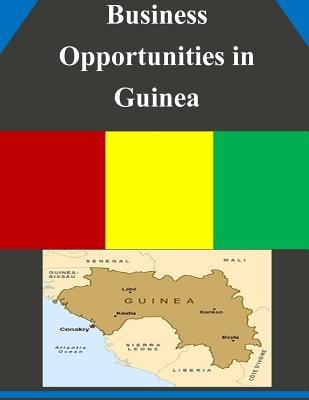
- We will send in 10–14 business days.
- Author: U S Department of Commerce
- Publisher: CreateSpace Independent Publishing Platform
- Year: 2014
- Pages: 52
- ISBN-10: 150233724X
- ISBN-13: 9781502337245
- Format: 21.6 x 27.9 x 0.3 cm, minkšti viršeliai
- Language: English
- SAVE -10% with code: EXTRA
Reviews
Description
Guinea, a country of approximately 12 million, has endured more than 50 years of authoritarian rule and severe economic mismanagement prior to the transition to a democratically elected government in 2010. Since then, and despite very real challenges in cementing democratic gains until the 2013 legislative elections were held, the country has been on a more stable, sustainable, and economically viable path. Despite a history of rampant corruption and fiscal misrule, the long-term economic prognosis for Guinea is better today than it was ten, twenty or thirty years ago. Guinea is home to nearly one-half of the world's bauxite supply, the world's largest untapped deposit of high-grade iron and promising possibilities of oil reserves. In addition, Guinea enjoys ample fertile soil and hyper-abundant rainfall sufficient, if harnessed, to provide hydroelectric power throughout the West African region. Macroeconomic management in the years after the 2010 democratic transition have been solid, and is poised to improve further with a HIPC-derived fiscal space to expand investment in infrastructure, health and education - $2.1 billion in external debt was forgiven in the fall of 2012, including approximately $93 million in bilateral debt with the United States government. Although much progress has been made, there is still far to go in order to reduce poverty and achieve shared prosperity. A legacy of political instability, insecurity and poor governance prevents the benefits of Guinea's natural wealth from reaching the vast majority living in extreme poverty. Although the return of political stability has brought renewed interest in Guinea from the private sector, an enduring legacy of corruption, inefficiency, and lack of government transparency continues to undermine Guinea's economic viability. Successive governments have failed in their turn to address the crumbling infrastructure issues and Guinea lacks the infrastructure capabilities necessary to support advanced commercial activities. Shortages in electricity, disrepair of road and rail systems, and the lack of access to clean water continue to plague development efforts. Guinea suffers from deplorable electricity service, irregular throughout the capital city and effectively absent in much of the rest of the country. The current government is eager to attract foreign investment and has made significant efforts to improve the process; however, Guinea remains a difficult place to invest.
EXTRA 10 % discount with code: EXTRA
The promotion ends in 21d.10:44:09
The discount code is valid when purchasing from 10 €. Discounts do not stack.
- Author: U S Department of Commerce
- Publisher: CreateSpace Independent Publishing Platform
- Year: 2014
- Pages: 52
- ISBN-10: 150233724X
- ISBN-13: 9781502337245
- Format: 21.6 x 27.9 x 0.3 cm, minkšti viršeliai
- Language: English English
Guinea, a country of approximately 12 million, has endured more than 50 years of authoritarian rule and severe economic mismanagement prior to the transition to a democratically elected government in 2010. Since then, and despite very real challenges in cementing democratic gains until the 2013 legislative elections were held, the country has been on a more stable, sustainable, and economically viable path. Despite a history of rampant corruption and fiscal misrule, the long-term economic prognosis for Guinea is better today than it was ten, twenty or thirty years ago. Guinea is home to nearly one-half of the world's bauxite supply, the world's largest untapped deposit of high-grade iron and promising possibilities of oil reserves. In addition, Guinea enjoys ample fertile soil and hyper-abundant rainfall sufficient, if harnessed, to provide hydroelectric power throughout the West African region. Macroeconomic management in the years after the 2010 democratic transition have been solid, and is poised to improve further with a HIPC-derived fiscal space to expand investment in infrastructure, health and education - $2.1 billion in external debt was forgiven in the fall of 2012, including approximately $93 million in bilateral debt with the United States government. Although much progress has been made, there is still far to go in order to reduce poverty and achieve shared prosperity. A legacy of political instability, insecurity and poor governance prevents the benefits of Guinea's natural wealth from reaching the vast majority living in extreme poverty. Although the return of political stability has brought renewed interest in Guinea from the private sector, an enduring legacy of corruption, inefficiency, and lack of government transparency continues to undermine Guinea's economic viability. Successive governments have failed in their turn to address the crumbling infrastructure issues and Guinea lacks the infrastructure capabilities necessary to support advanced commercial activities. Shortages in electricity, disrepair of road and rail systems, and the lack of access to clean water continue to plague development efforts. Guinea suffers from deplorable electricity service, irregular throughout the capital city and effectively absent in much of the rest of the country. The current government is eager to attract foreign investment and has made significant efforts to improve the process; however, Guinea remains a difficult place to invest.


Reviews